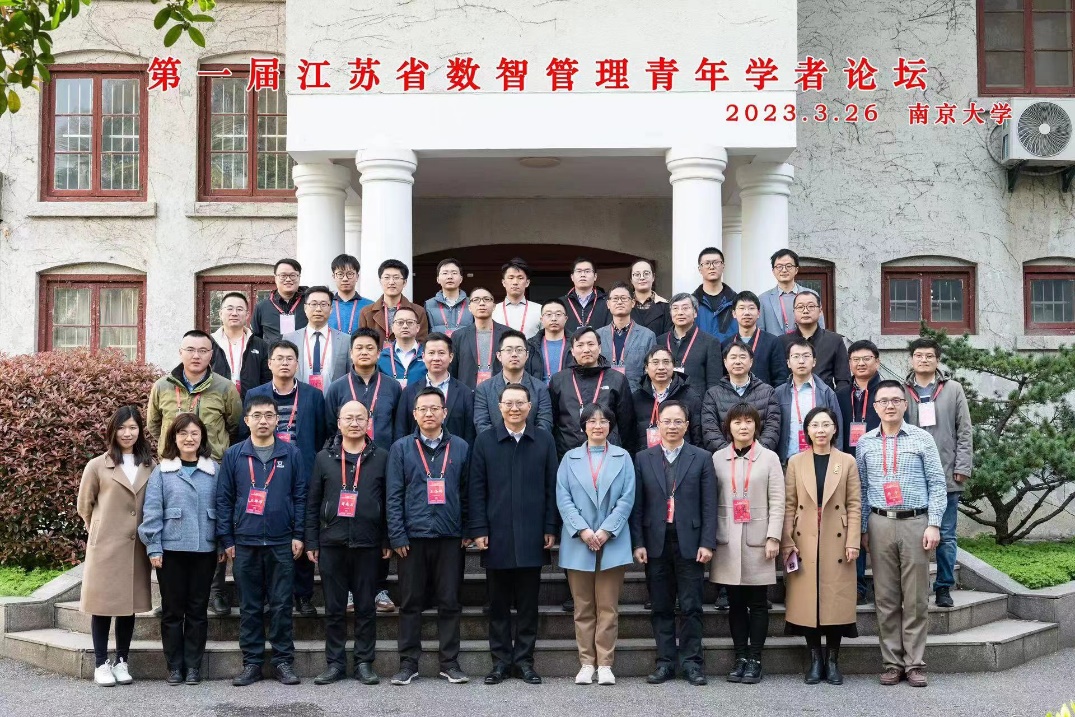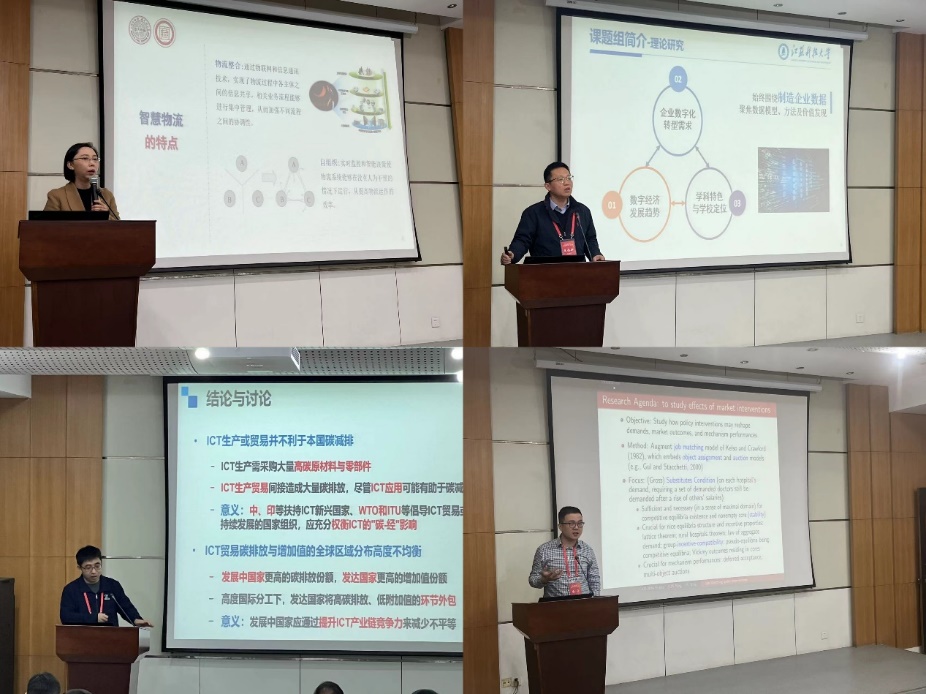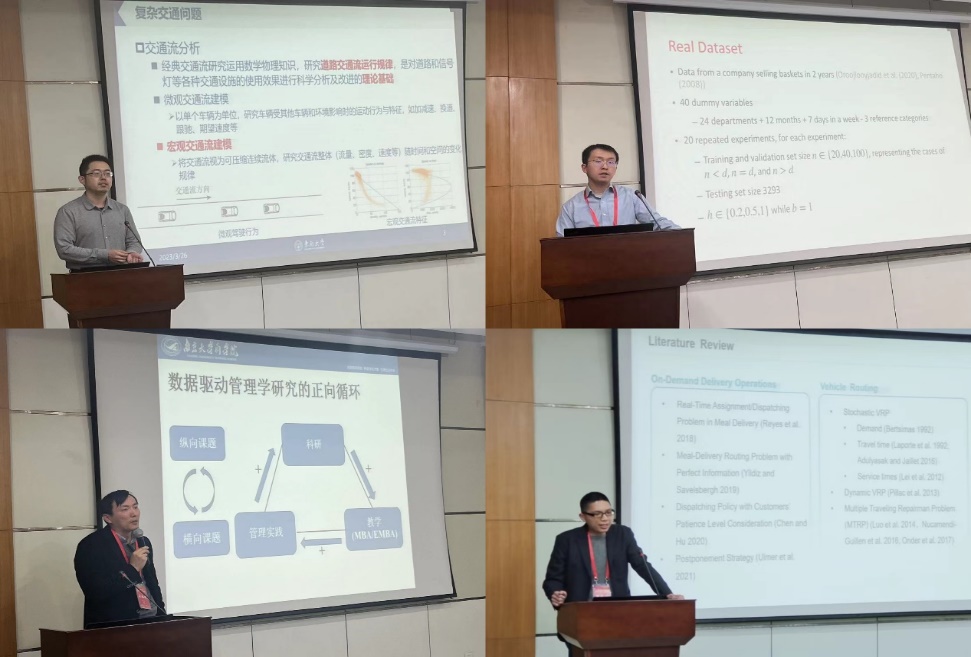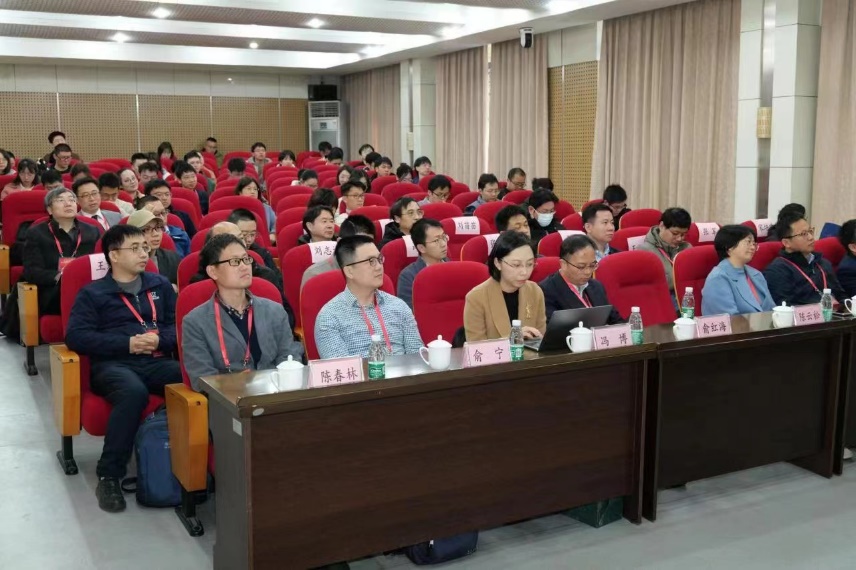Global industry is gradually entering the era of intelligence driven by informationization, and Chinese enterprises are accelerating the layout of "digital intelligence" transformation. At the same time, the transformation of "digital intelligence" has brought new scenarios and problems to management science research. In the face of this major social demand and disciplinary frontier, the School of Management and Engineering at Nanjing University and the Jiangsu Operations Research Society jointly organized the first "Jiangsu Young Scholars Forum on Digital Intelligence Management" on March 26, 2023.

The opening ceremony of the forum was hosted by Prof. Chen Caihua, Vice Dean of School of Management and Engineering, Nanjing University. Prof. Chen Yunsong, Member of the Standing Committee of the Party Committee, Director of the Party Office and Director of the Publicity Department of Nanjing University, Prof. Cai Xingju, Director of the Operations Research Society of Jiangsu Province, and Prof. Yu Honghai, Dean of the School of Management and Engineering of Nanjing University, delivered speeches respectively.
In his speech, Prof. Chen Yunsong pointed out that the transformation of digital intelligence has brought new opportunities and challenges to the research in the field of management science, which requires not only the support of intelligent technology, but also intelligent decision making and management driven by data and algorithms, with equal emphasis on technology and management. This is in line with the development characteristics of "integration of control and management", which has always been emphasized by the School of Management and Engineering of Nanjing University, and is in line with the long-accumulated disciplinary advantages of the school. Director Chen further put forward three hopes: firstly, he hoped that this forum could focus on the international frontier, explore the latest trend and development direction of digital intelligence transformation, form influential new research directions, and promote the development of the field of management science; secondly, he hoped that this forum could provide practical solutions for the local economic development by combining the major needs of Jiangsu Province; thirdly, he hoped that this forum could be held for a long time to provide a new forum for young scholars in the field of management science. Third, we hope that this forum can be held for a long time to provide a new platform for young scholars in the field of management science to collide ideas and exchange academics.

Prof. Chen Yunsong delivered a speech
Prof. Cai Xingju introduced the historical background and development trend of Jiangsu Operations Research Society, and pointed out that the society covers the fields of operations research, management and finance, and is in the leading position in China. At the same time, he pointed out that as the society entered the era of digital intelligence, Jiangsu Province also listed the intelligent transformation of manufacturing industry and digital transformation as important social needs and tasks. Chairman Cai pointed out that this forum aims to provide a platform for young scholars in the field of digital intelligence management to communicate, learn and share, focus on the frontier hotspots in the field of digital intelligence management, discuss the latest research results and practical experience in data analysis, information technology, operations research, decision science, etc., jointly explore the future development direction of the field of digital intelligence management, and promote academic research and practical innovation in this field.

Speech by Prof. Cai Xingju
Prof. Yu Honghai mentioned in his speech that the vigorous development of digital economy has become a national strategy, the main part of which is the digitalization of industry, accounting for more than 80% of the digital economy. The main path and way of industry digitization is "intellectual transformation and digital transformation". In this regard, Jiangsu Provincial Government issued the "Three-Year Action Plan for Intelligent Transformation and Digital Transformation of Manufacturing Industry in Jiangsu Province (2022-2024)" at the end of 2021, proposing that by the end of 2024, "industrial enterprises above the scale in the province will fully implement intelligent transformation and digital transformation". The goal is to "fully implement intelligent transformation and digital transformation of industrial enterprises above the scale of the province" by the end of 2024. However, in reality, enterprises generally have the dilemma of "not wanting to transform, not daring to transform, and not knowing how to transform". Therefore, experts and scholars need to play a leading role in promoting, through the establishment of this academic exchange platform, to discuss and study the needs of Jiangsu Province, to help enterprises to carry out intelligent transformation of digital transformation.

Speech by Prof. Yu Honghai
Eight expert presentations were held in this forum. The three morning presentations were chaired by Professor Xiao Tiaojun from School of Management and Engineering, Nanjing University and Professor He Wei from School of Business, Nanjing University. Professor Feng Bo, Dean of School of Business, Soochow University, gave a report entitled "Intelligent Logistics Operation and Management: Overview and Future Research", which started from intelligent technologies such as Internet of Things, information and communication technology and artificial intelligence, combined with cases of logistics network system construction, including the underlying technology application, business logic and operation framework of logistics system, and finally established the optimization problems in specific scenarios. Professor Wang Nianxin, Dean of School of Economics and Management, Jiangsu University of Science and Technology, gave a report entitled "Analysis and Application of Information System Usage Data of Manufacturing Enterprises", which explored its application in performance evaluation, cloud-based migration, and modular reconstruction of information system based on the accumulation of the institute in the shipping industry and on the analysis of information system user usage rules. Wang Qunwei, Professor of School of Economics and Management and Deputy Director of Personnel Department of Nanjing University of Aeronautics and Astronautics, gave a report entitled "Two Challenges in the Era of Digital Intelligence: Decarbonization and Fairness", which gave the research results from two perspectives of decarbonization and fairness through the analysis of ICT trade process in the era of digital intelligence.

Plenary speakers
The five afternoon presentations were chaired by Prof. Wang Yudong, Dean of School of Economics and Management, Nanjing University of Technology, and Prof. Xue Weili, Vice Dean of School of Economics and Management, Southeast University. Professor Yu Ning, Executive Director of the Institute of Social and Economic Research, Nanjing Audit University, gave a presentation entitled "Job Matching under Interventions", starting with two related studies on market design from the perspectives of hard and soft constraints of market intervention. Professor Liu Zhiyuan, Associate Dean of the College of Transportation at Southeast University, gave a presentation titled "Improved Gaussian Process Models for Dealing with Complex Traffic Problems", proposing a data-driven traffic flow model that introduces methods such as modeling statistical relationships between variables directly and not relying on equilibrium state assumptions, which has wide applicability. Professor Rui Gao from the School of Business at the University of Texas at Austin gave a presentation titled "Optimal Robust Policy for Feature-Based Newsvendor". Professor Gao investigated a feature-based policy optimization for newsvendor problem, seeking an end-to-end, explicit mapping from features to subscription decisions. Professor Song Peijian from the Department of Marketing and E-Commerce, School of Business, Nanjing University, gave a presentation titled "Empirical Research on Data-Driven Management: Two Papers as Examples", using two specific problems of Suning Omnichannel, online ordering store pickup and backend data of room booking APP, as examples to emphasize the need to help companies make decisions to achieve cost reduction and efficiency. Associate Professor Luo Zhixing from School of Management and Engineering, Nanjing University, gave a presentation titled "On-Demand Delivery from Stores: Dynamic Dispatching and Routing with Random Demand", modeling the last-mile delivery system with on-time performance as the main goal to achieve random dynamic The presentation was entitled "OnDemand Delivery from Stores: Dynamic Dispatching and Routing with Random Demand".

Plenary speakers
The Jiangsu Digital Intelligence Management Young Scholars Forum received positive response and enthusiastic participation from young scholars from various universities in the province. The forum focused on new scenes, new problems and new methods of management science in the era of Industry 4.0 digital intelligence transformation, aiming to build a platform for young scholars in management science to exchange ideas and discuss academically. Dean Yu Honghai made a concluding speech at the closing of the conference, saying that the reports of the conference were brilliant and laid the foundation for the future of digital intelligence management and provided rich research directions, and he hoped that the symposium could help enterprises to better promote intelligent transformation and digital transformation and contribute to the high-quality development of China's economy.

Conference site

